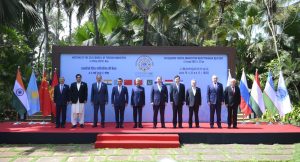When Pakistan’s Foreign Minister Bilawal Bhutto-Zardari landed in Goa for the Shanghai Cooperation Organization (SCO) foreign ministers meeting on May 4-5, he became the first foreign minister from his country to visit India in over a decade. Yet, in the run-up to his arrival, few expected him to oversee any breakthrough in India-Pakistan ties.
The two neighbors have had frosty, almost nonexistent ties since India revoked Kashmir’s autonomy in 2019, and neither side has had any incentive to move the needle. Pakistan’s current government is a fragile coalition and is only months away from the next election. Its electorate is unlikely to accept any concessions to India on the Kashmir dispute or a thaw with Prime Minister Narendra Modi’s Hindu nationalist government. Domestic rhetoric has frequently targeted Modi for what many Pakistanis see as systemic oppression of Indian Muslims.
India is also a year away from parliamentary elections, and as various states head to the polls in the meantime, Hindu nationalist politicians have upped the ante against Muslims in the country. Modi has spent the last few days in southern India, where he and others are making the case for being tough on terrorism and slammed the opposition Congress party for appeasing Muslim voters. All this comes close on the heels of a controversial new movie, titled “The Kerala Story,” which claims that some 32,000 Muslim women from the southern state of Kerala were recruited to the Islamic State of Iraq and Syria (ISIS).
Given that background, it was no surprise that Bhutto-Zardari’s meeting this week with India’s External Affairs Minister Subrahmanyam Jaishankar was fractious.
Even before he arrived, Bhutto-Zardari appeared to temper expectations, tweeting that his visit is “focused exclusively on the SCO” and discussions with “friendly countries.” While in India, he blamed India for using the word “terrorism” as an “Islamophobic wolf whistle not only to whip up Hindu sentiment in India but also to browbeat Pakistan.”
Jaishankar too was combative. Having cordially posed for a welcome photograph with Bhutto-Zardari upon his arrival, Jaishankar proceeded to lampoon the Pakistani foreign minister as the “spokesperson of a terrorism industry” and rubbished the possibility of bilateral talks. “Victims of terrorism do not sit together with perpetrators of terrorism to discuss terrorism,” he said.
Yet, even as domestic imperatives pull India and Pakistan apart, strategic imperatives are bringing them together. For starters, Pakistan’s moribund economy could benefit greatly from stronger ties with India. Amidst weak domestic production and crippling debt, Pakistan’s foreign exchange reserves now stand at a paltry $4 billion — barely enough to finance a month’s worth of imports. A $6.5 billion deal with the International Monetary Fund (IMF) was derailed after the IMF was unconvinced that Islamabad would be able to meet its financial obligations. Pakistan now anxiously waits for the green signal on a $1.1 billion bailout package from the IMF.
Meanwhile, India is grappling with its own geopolitical troubles. New Delhi has been wary of fighting a simultaneous two-front war with China and Pakistan for years. Given the power gap between Beijing and New Delhi, the Modi government has often found its hands tied while dealing with China. In February, Jaishankar courted controversy when he candidly admitted as much. “They are the bigger economy, what I am going to do?” he asked. “I am a smaller economy. Am I going to sort of pick up a fight with a bigger economy?”
With Pakistan, however, India enjoys greater leverage. In the immediate aftermath of deadly border clashes with the Chinese military in 2020, Modi pivoted to backchannel talks with Pakistan, which yielded some progress on issues ranging from water sharing to unresolved visas.
Even from a broader geostrategic perspective, easing tensions with Pakistan could help alleviate some headaches for Modi.
In the aftermath of the Ukraine invasion, India has pursued what one might arguably call a hard pivot toward Russia. Imports from Moscow have multiplied several times, even as the West seeks Russia’s economic isolation. At the SCO, India is expected to preside over the inclusion of Belarus as a full member — a staunch Russian ally that has also been targeted by sanctions from the West.
Meanwhile, impending difficulties in ties with the U.S. will also raise Russia’s strategic importance to New Delhi. Whispers are growing in Washington over India’s unreliability as a U.S. ally, particularly in the wake of its reaction to the Ukraine war and doubts over whether New Delhi would support the U.S. during a war in Taiwan.
Yet, India’s robust ties with Russia have run parallel with Pakistan’s own burgeoning ties with Moscow. Last month, Pakistan made its first purchase of discounted Russian crude — greatly easing its import bill distress. That had followed a visit to Islamabad early this year by the Russian energy minister. Given Pakistan’s close friendship with China, Islamabad has some leverage and support in continuing to pursue this relationship for its own economic and defense needs. If tensions remain high with Pakistan, those ties could potentially make New Delhi uncomfortable.
In the immediate term, however, neither India nor Pakistan seems primed to ease tensions — at least in public. Rhetoric looks set to remain combustible, as politicians on both sides play on communal fury. Yet, as volatile as public discourse might be, New Delhi and Islamabad will likely keep those tensions from spilling onto the ground.

































